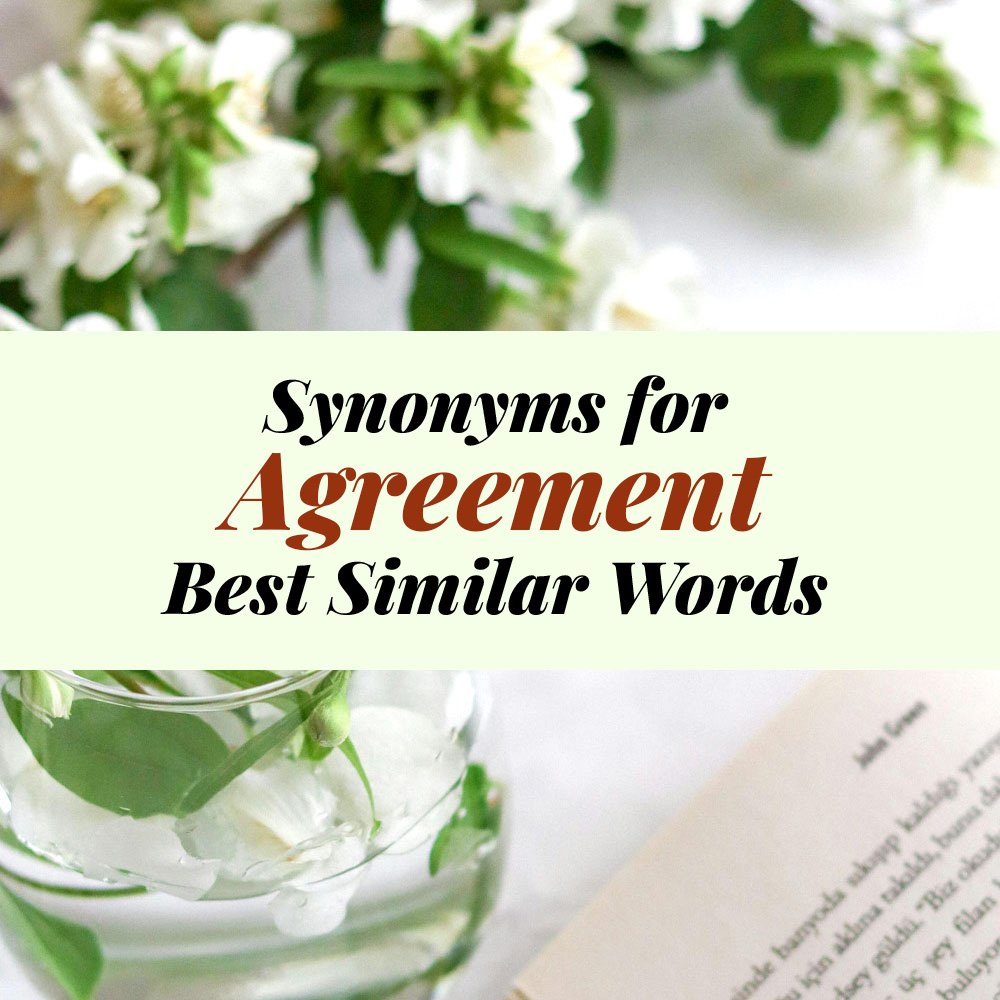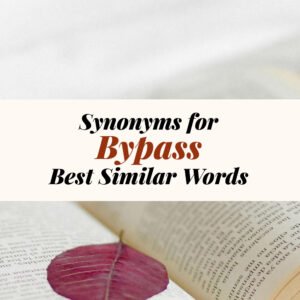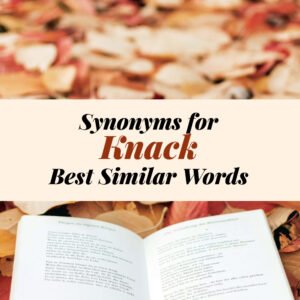Have you ever been in a conversation where you wanted to express “agreement” but didn’t want to use the same word again and again? In this article, you’ll discover 19 other ways to say agreement, such as understanding, consensus, and accord, along with meanings and examples you can use daily.
| Synonym | Meaning | Example |
|---|---|---|
| Understanding | A shared feeling or thought between people about something. | We reached an understanding about how to manage the project together. |
| Consensus | A general opinion or shared decision among a group. | The team reached a consensus before launching the campaign. |
| Accord | A formal or informal arrangement or harmony between sides. | The two companies signed an accord to work together. |
| Contract | A written or spoken agreement that is legally binding. | They signed a contract to confirm their business deal. |
| Treaty | A formal agreement between two or more parties, usually countries. | The nations signed a peace treaty to end the conflict. |
| Pact | A promise or agreement made between people or groups. | They made a pact to support each other no matter what. |
| Deal | An arrangement or understanding between people, often in business. | We made a deal with the supplier for faster delivery. |
| Settlement | An arrangement that resolves a disagreement or problem. | Both sides reached a settlement after long discussions. |
| Arrangement | A planned and agreed way of doing something together. | We came to an arrangement about sharing responsibilities. |
| Understanding | A mutual comprehension or friendly agreement between people. | There’s an understanding between us about how we’ll move forward. |
| Harmony | When people or groups work together peacefully and agreeably. | The new policy brought harmony to the workplace. |
| Unity | Being together or agreeing on the same goal or idea. | There was unity among the members during the meeting. |
| Concurrence | When two or more people agree on the same opinion. | Her concurrence with the plan made everyone feel confident. |
| Conformity | Acting according to shared rules or expectations. | The team worked in conformity with company standards. |
| Collaboration | Working together toward a shared goal with agreement. | Their collaboration resulted in a very successful product launch. |
| Compact | A formal agreement or contract between groups or people. | The two leaders signed a compact of mutual cooperation. |
| Covenant | A serious or formal promise between parties. | The partners made a covenant to uphold honesty in their work. |
| Reconciliation | Restoring friendly relations and agreement after conflict. | After years of dispute, there was finally reconciliation between the two families. |
| Understanding (mutual) | A shared agreement or respect between parties. | There’s a mutual understanding that helps our team function smoothly. |
Understanding
“Understanding” shows that two or more people share the same thought or view about something. It doesn’t always have to be written down or formal; it’s often based on trust and communication. When people have understanding, they know each other’s expectations and agree on how things should happen. It brings cooperation and smooth relationships between people or teams. In daily life, we often use “understanding” when describing friendly or work-related situations where everyone is on the same page.
- We have a good understanding about how to complete our tasks.
- There is an understanding between the teacher and the students.
- Their mutual understanding keeps their friendship strong.
Consensus
“Consensus” means a general or shared opinion that everyone agrees on. It usually involves discussion, listening, and compromise until all parties accept the same decision. In workplaces, meetings, or teams, consensus helps build unity because everyone feels heard and respected. It’s not just about voting—it’s about reaching a common ground where no one feels left out. Achieving consensus shows that communication and cooperation are strong among members.
- The committee reached a consensus on the new policy.
- After hours of debate, they finally found consensus.
- There was clear consensus to move forward with the plan.
Accord
“Accord” means harmony or agreement between people, groups, or countries. It can be used in both formal and informal settings. When two sides are in accord, it means they have found a way to understand and support each other. This term is often used in diplomacy, business, or when talking about peaceful relationships. An accord builds trust and ensures that both sides benefit from the relationship. It often represents balance and cooperation.
- The countries signed an accord for mutual growth.
- Their accord led to a long-lasting partnership.
- Everyone acted in accord with the company’s values.
Contract
A “contract” is a formal agreement, usually written, that binds the people or parties involved. It is used to make sure everyone follows the same terms and conditions. Contracts are common in business, employment, and law. Having a contract provides clarity, trust, and protection for both sides. It shows seriousness and commitment to an agreement. When you sign a contract, you promise to do what is written in it.
- She signed a contract for her new job.
- The contract made the terms of payment very clear.
- They canceled the contract due to unmet conditions.
Treaty
A “treaty” is a formal agreement between countries or large organizations. It is often used to end conflicts, create alliances, or set shared goals. Treaties are signed after careful discussion and often involve legal or diplomatic processes. They represent trust and cooperation between nations. When two sides sign a treaty, it shows they have chosen peace and partnership instead of conflict or competition. It also helps ensure stability.
- The peace treaty ended years of war.
- A new trade treaty was signed between the two nations.
- The treaty helped both sides improve their relationship.
Pact
A “pact” is a promise or agreement made between people, groups, or nations. It can be formal or informal and often involves trust and loyalty. A pact shows that both sides are serious about keeping their word. It is commonly used in friendships, partnerships, or even politics. Making a pact means there is a shared purpose or goal. It’s often more emotional and personal than a contract.
- They made a pact to never lie to each other.
- The friends had a pact to travel together every summer.
- The leaders formed a pact for regional cooperation.
Deal
A “deal” refers to an arrangement or understanding between two or more people, often in business. It can be verbal or written. When someone says “it’s a deal,” it means they accept the terms offered. Deals often involve giving something in exchange for something else, like products, services, or promises. Making a deal requires trust and negotiation. It is one of the most common ways to express agreement in daily conversation.
- We made a deal to share profits equally.
- The company closed a big deal last month.
- Let’s make a deal to help each other out.
Settlement
A “settlement” means finding a solution or agreement after a disagreement or problem. It often happens after negotiation or compromise. Settlements are common in legal cases, business conflicts, or personal disputes. Reaching a settlement means both sides accept terms they can live with, even if it’s not perfect. It brings peace and ends arguments, helping people move forward positively.
- The two companies reached a settlement over their dispute.
- They agreed to a fair settlement after hours of talk.
- A legal settlement was made to resolve the case.
Arrangement
An “arrangement” is a planned agreement about how something will be done. It can be simple or complex, formal or informal. Arrangements show that both sides have discussed and decided on responsibilities, times, or actions. They help avoid confusion and make cooperation smoother. When there’s an arrangement, it means both parties have agreed on a practical way to move forward.
- We made an arrangement to meet every Monday.
- The arrangement allowed everyone to work more efficiently.
- They had an arrangement to share the space equally.
Harmony
“Harmony” means peace, balance, and understanding between people or groups. When there’s harmony, everyone works together without conflict. It goes beyond simple agreement—it means people support and respect each other’s roles. Harmony is important in teams, families, and communities. It helps create a positive environment where everyone feels valued and connected.
- There was harmony among all members of the group.
- The new manager brought harmony to the workplace.
- The couple lived in harmony for many years.
Unity
“Unity” is when people come together and share the same goals or ideas. It’s a strong form of agreement where everyone works as one. Unity helps build strength and cooperation, especially in teams, organizations, or communities. When there’s unity, disagreements are minimized because everyone is focused on success together. It shows commitment, respect, and teamwork.
- The team showed unity during the project.
- There was unity in their decision to help others.
- Unity among workers improved the company’s performance.
Concurrence
“Concurrence” means agreeing with someone or sharing the same opinion or decision. It’s a formal way to express that you support another person’s idea or plan. When people show concurrence, it means they align in thought or action. It’s often used in official or professional contexts to confirm agreement or shared understanding.
- Her concurrence with the proposal pleased everyone.
- There was full concurrence between the two departments.
- The board members expressed their concurrence with the CEO’s plan.
Conformity
“Conformity” means following shared rules, standards, or expectations. It shows agreement by action rather than just words. When people act in conformity, they align their behavior with what’s accepted or agreed upon. It helps maintain order and cooperation in a group. It doesn’t mean losing individuality, but rather respecting the established way of doing things.
- The employees worked in conformity with company policies.
- His actions were in conformity with social norms.
- The project was carried out in conformity with the agreement.
Collaboration
“Collaboration” means working together toward a shared goal or purpose. It goes beyond just agreeing—it means actively helping and contributing. Collaboration is common in teamwork, creative projects, and partnerships. When people collaborate, they combine skills and ideas, creating better results. It builds respect and understanding through shared effort and purpose.
- Their collaboration led to a breakthrough idea.
- The artists worked in close collaboration on the project.
- Collaboration between teams improved overall performance.
Compact
A “compact” is a formal or serious agreement between two or more sides. It’s similar to a contract but can also mean a moral or political promise. Compacts are often used between organizations or groups to confirm mutual responsibilities. It shows strong commitment and unity in purpose. When a compact is signed, both sides promise to stand by their agreement.
- The leaders signed a compact for future cooperation.
- The compact strengthened the partnership between the two groups.
- They entered a compact to protect shared interests.
Covenant
A “covenant” is a solemn or formal promise made between people or groups. It’s often associated with faith, commitment, or long-term cooperation. A covenant represents deep trust and responsibility. It’s stronger than a normal agreement because it’s based on moral or emotional bonds as well as formal ones. It shows dedication to keeping promises no matter the challenges.
- The partners made a covenant to always act with integrity.
- Their covenant ensured loyalty and respect.
- The covenant marked the beginning of a lasting alliance.
Reconciliation
“Reconciliation” means restoring good relations and agreement after disagreement or conflict. It happens when people forgive, understand each other, and decide to move forward. Reconciliation brings peace and emotional healing. It’s not only about words but also about actions that rebuild trust. It’s a powerful form of agreement because it turns conflict into cooperation.
- They reached reconciliation after years of misunderstanding.
- The reconciliation between the two sides brought happiness.
- The meeting ended with reconciliation and mutual respect.
Understanding (Mutual)
“Mutual understanding” is when both sides share the same ideas and feelings. It goes beyond agreement—it’s about empathy and trust. People who have mutual understanding can communicate smoothly and work together easily. It’s important in friendships, families, and workplaces because it prevents conflict and supports strong relationships. It helps create peace and cooperation.
- There is mutual understanding between the partners.
- Their mutual understanding makes teamwork easier.
- The group works well because of mutual understanding.
Arrangement (Formal)
A “formal arrangement” means a structured or official agreement made between people, organizations, or groups. It’s often documented and clear in its terms. This type of arrangement helps define roles, timelines, and expectations. It’s useful in workplaces, partnerships, and events because everyone knows their duties. Such arrangements build trust and responsibility through clear organization.
- They agreed to a formal arrangement for joint research.
- The formal arrangement made communication smoother.
- A formal arrangement was signed to manage the project.

Final Thoughts
There are many different ways to express “agreement,” each carrying its own tone and purpose. Whether it’s a legal contract, a friendly understanding, or a national treaty, the word you choose can shape how your message feels. Using these synonyms helps express cooperation, peace, and shared purpose in many situations.









